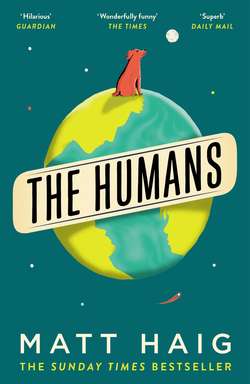Читать книгу The Humans - Matt Haig - Страница 28
На сайте Литреса книга снята с продажи.
Primes
ОглавлениеThe document carried on in this excited way for a bit longer. I learned a little bit more about Bernhard Riemann, a painfully shy, nineteenth-century German child prodigy who displayed exceptional skill with numbers from an early age, before succumbing to a mathematical career and a series of nervous breakdowns which plagued his adulthood. I would later discover this was one of the key problems humans had with numerical understanding – their nervous systems simply weren’t up to it.
Primes, quite literally, sent people insane, particularly as so many puzzles remained. They knew a prime was a whole number that could only be divided by one or itself, but after that they hit all kinds of problems.
For instance, they knew that the total of all primes was precisely the same as the total of all numbers, as both were infinite. This was, for a human, a very puzzling fact, as surely there must be more numbers than prime numbers. So impossible was this to come to terms with, some people, on contemplating it, placed a gun into their mouth, pulled the trigger, and blew their brains out.
Humans also understood that primes were very much like the Earth’s air. The higher you went, the fewer of them there were. For instance, there were 25 primes below 100, but only 21 between 100 and 200, and only 16 between 1000 and 1100. However, unlike with the Earth’s air it didn’t matter how high you went with prime numbers as there were always some around. For instance, 2097593 was a prime, and there were millions between it and, say, 4314398832739895727932419750374600193. So, the atmosphere of prime numbers covered the numerical universe.
However, people had struggled to explain the apparently random pattern of primes. They thinned out, but not in any way that humans could fathom. This frustrated the humans very much. They knew that if they could solve this they could advance in all kinds of ways, because prime numbers were the heart of mathematics and mathematics was the heart of knowledge.
Humans understood other things. Atoms, for instance. They had a machine called a spectrometer which allowed them to see the atoms a molecule was made from. But they didn’t understand primes the way they understood atoms, sensing that they would do so only if they could work out why prime numbers were spread out the way they were.
And then in 1859, at the Berlin Academy, the increasingly ill Bernhard Riemann announced what would become the most studied and celebrated hypothesis in all mathematics. It stated that there was a pattern, or at least there was one for the first hundred thousand or so primes. And it was beautiful, and clean, and it involved something called a ‘zeta function’ – a kind of mental machine in itself, a complex-looking curve that was useful for investigating properties of primes. You put numbers into it and they would form an order that no one had noticed before. A pattern. The distribution of prime numbers was not random.
There were gasps when Riemann – mid panic attack – announced this to his smartly dressed and bearded peers. They truly believed the end was in sight, and that in their lifetimes there would be a proof that worked for all prime numbers. But Riemann had only located the lock, he hadn’t actually found the key, and shortly afterwards he died of tuberculosis.
And as time went on, the quest became more desperate. Other mathematical riddles were solved in due course – things like Fermat’s Last Theorem and the Poincaré Conjecture – which left proof of the long-buried German’s hypothesis as the last and largest problem to solve. The one that would be the equivalent of seeing atoms in molecules, or identifying the chemical elements of the periodic table. The one that would ultimately give humans supercomputers, explanations of quantum physics and interstellar transportation.
After getting to grips with all this I then trawled through all the pages full of numbers, graphs and mathematical symbols. This was another language for me to learn, but it was an easier and more truthful one than the one I had learnt with the help of Cosmopolitan.
And by the end of it, after a few moments of sheer terror, I was in quite a state. After that very last and conclusive ∞, I was left in no doubt that the proof had been found, and the key had turned that all-important lock.
So, without so much as a second’s thought, I deleted the document, feeling a small rush of pride as I did so.
‘There,’ I told myself, ‘you may have just managed to save the universe.’ But of course, things are never that simple, not even on Earth.
